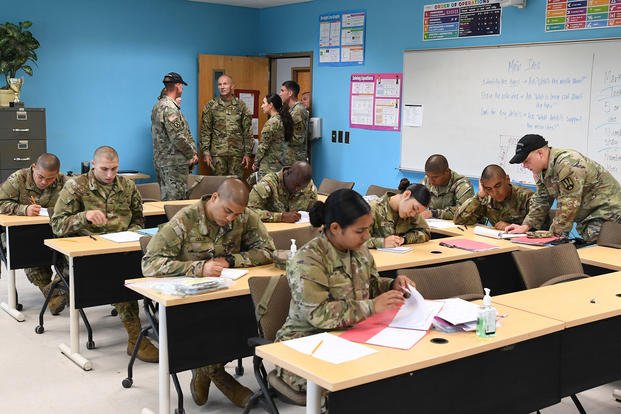The Army's pre-basic training courses for applicants who come up short on academic or body fat standards will expand this month as service leaders eye that effort as a potentially key tool to combating a crippling recruiting slump.
Service leaders plan to add four additional companies following an initial pilot program that kicked off in August at Fort Jackson, South Carolina, for new recruits who had up to 6% more body fat than the Army allows or scored between 21 and 30 on the Armed Services Vocational Aptitude Battery, or ASVAB, test. Academic performance that low can prevent an applicant from enlisting or dramatically limit the jobs available to them.
Two of the new companies will be at Fort Jackson, which will allow an additional 2,000 students per year to enter the academic program, and another two companies at Fort Benning, Georgia, though that base will offer only an academic camp for some 6,400 students per year.
Read Next: More Than One-Third of Tricare Patients Have Limited or No Access to a Psychiatrist, Study Finds
The program, known as the Future Soldier Preparatory Course, is designed to expand the pool of eligible Americans who can join the service by creating short camps that help applicants reach Army standards. The service came up short of its recruiting goal last year, bringing in 45,000 new active-duty troops -- well below its goal of 60,000. This year, the service is even more ambitious, seeking 65,000 new recruits.
"The Future Soldier Prep Course is giving young Americans who want to serve the chance to do so, by helping them not only meet our standards, but in many cases rise above them," Gen. James McConville, the Army's top officer, told Military.com in a statement. "We started seeing positive results early on in the program, and I am happy to see it expand to additional installations so we can continue to attract and invest in our nation's best talent."
Applicants in both tracks have 90 days to boost their scores or lose enough body fat to come into compliance with Army standards. In total, 3,206 students have attended one of those tracks so far, of which 2,965 have graduated and moved onto basic training.
Service leadership described the pilot program for the camps as showing promise.
In total, as a result of the expansion, the service can potentially move roughly 12,000 recruits through the prep courses and onto basic who otherwise would not have been able to serve. That number comes close to making the difference for how many soldiers the Army came short on recruiting in 2022.
The service is heavily focused on the academic track created by the program, with test scores falling 9% on average since the pandemic, according to Army data. Meanwhile, test scores for many nationwide tests, such as the ACT, have also plummeted since the pandemic. Allowing recruits a chance to score higher on the ASVAB allows them to potentially qualify for higher enlistment bonuses, but more important for the Army -- fill in high-demand technical vacancies, including cyber warfare roles.
The new course at Fort Benning is open to higher-performing ASVAB applicants -- those who score between 31 and 49 -- though those recruits will have only 30 days to retest for a higher score and potentially qualify for a different job than they enlisted for. If their scores don't see a boost, they'll ship onto basic training and fulfill their initial contract.
On the pilot program's academic track, students have boosted their ASVAB scores by 17 points on average after tutoring, the Army said. On the fitness side, 87% of students graduate within the first three weeks, losing 1% of their body fat per week on average following physical fitness training and instruction on healthy eating habits.
The troubled recruiting climate is an amalgamation of issues, including a relatively competitive and healthy civilian market. But recruiters interviewed by Military.com say the volume of interested applicants isn't the key concern, it's the quality. The service estimates that only about 23% of young Americans are even qualified for service, most of that issue stemming from an obesity crisis and falling academic performance, leading to poor ASVAB scores.
Recruiters also point to a greater scrutiny during medical screenings for minor conditions or past injuries through Military Health System Genesis, a massive database that can see medical records. In the past, recruiters or applicants might have skirted around disclosure of those records to avoid hiccups in the recruiting process.
"The model developed at Fort Jackson has been overwhelmingly successful at preparing and building quality recruits by tapping into their unrealized potential," Maj. Gen. Curtis Buzzard, Fort Benning commanding general, said in a statement. "We are excited to bring the Future Soldier Preparatory Course to Fort Benning and increase the opportunity to serve in our Army without sacrificing the quality needed across the force."
-- Steve Beynon can be reached at Steve.Beynon@military.com. Follow him on Twitter @StevenBeynon.
Related: Even More Young Americans Are Unfit to Serve, a New Study Finds. Here's Why.












